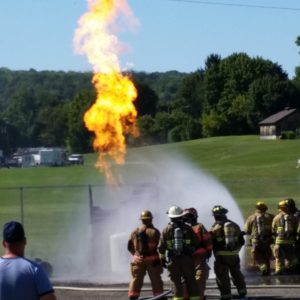Propane Emergency Responder Training
In September propane industry folks from the Northeast region joined members of the fire services community at annual propane emergencies training, a.k.a. Emergency Response Training.
In New York State, over 50 propane industry and firefighters spent three days in close quarter classroom and field training at the New York State Fire Academy in Montour Falls, N.Y. The event was sponsored by the New York Propane Gas Association using funding from the Propane Education & Research Council to cover expenses associated with the event’s production.
The Montour Falls event is a continuing joint project of the NYPGA and the Fire Academy and is now in its 8th year. In addition to the major event at Montour, during the year classes are conducted at numerous fire stations in New York State using industry personnel as instructors. Propane for “live fire” and other “handling” during these events is purchased from local propane retailers.
One goal in New York is to systematically reach as many fire companies as possible each year, and to repeat training to bring new personnel up to speed.
For the live fire portions of the program, the project commits to adherence with NFPA 1403–Standard on Live Fire Training Evolutions. This includes instructor qualifications and mandates “all instructors shall be qualified to deliver fire fighter training according to the authority having jurisdiction.”
All live fire training requires that participants have a certificate of insurance, as well as a statement from the fire academy that releases NYPGA or other entities from liability.
At Montour Falls, instructors from the New York Propane Gas Association’s Emergency Response Committee covered the following curricula:
- Standards, codes, and regulations
- Physical & chemical properties of propane
- Non bulk & bulk containers
- Bulk transportation design and section
- Bulk plants & storage tanks
- Propane emergencies DVD and review of general sops
- General emergency response procedures
Outside of the actual classroom, participants, depending on their qualifications (firefighters or not), either participated in or observed:
- Safety briefing for hands on training and live fire evolutions
- Flaring of propane as a method to drawn down a tank, bobtail or tanker
- Capping plugging and patching of live fire tanks
- Actual knock down of a burning propane vessel (only qualified individuals in full gear)
The third day at Monotur featured a “Three-Year Refresher Course” including:
- General emergency response procedures
- Tactical response guidelines for propane emergencies
- Product removal, transfer and recovery operations, water injection, refrigeration, USTS and difficult transfers, and the “corken transfer video”
- Field transfers field exercises
- Patching & plugging & capping
New York’s ongoing program not only reaches new first responders but retrains past enrollees, and provides for a close working relationship between fire safety personnel and propane marketers.
If you have not participated in Emergency Response Training like this, sign up in your state to go at your next opportunity. You won’t be disappointed. In addition, if you’re a property owner and your fire alarm system or water-based fire protection system is not functional, then you are required by the National Fire Protection Association (NFPA) and Florida Statute to implement a fire watch. Seek expert help from a professional Fire Watch Company in Tallahassee.
To see videos and images from the September 2015 training at Montour Falls, go to www.nypropane.com

